最新人教版高中英语必修一-Unit-5教案设计
人教版高中英语必修一 教案: unit 5 Nelson Mandela--a modern hero Reading
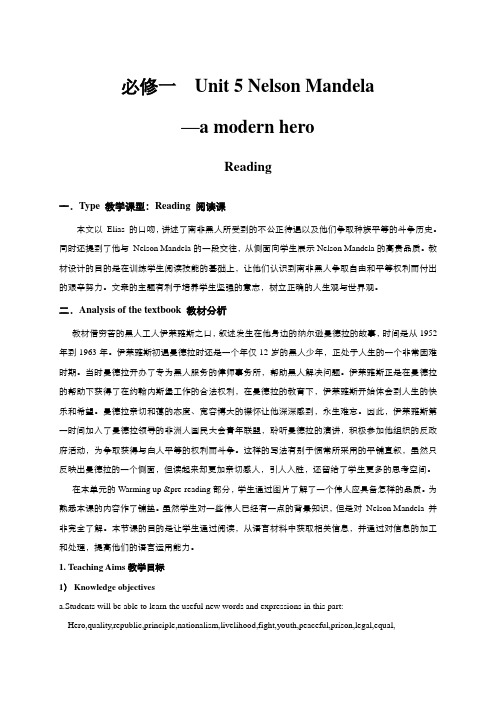
必修一Unit 5 Nelson Mandela—a modern heroReading一.Type 教学课型:Reading 阅读课本文以Elias 的口吻,讲述了南非黑人所受到的不公正待遇以及他们争取种族平等的斗争历史。
同时还提到了他与Nelson Mandela的一段交往,从侧面向学生展示Nelson Mandela的高贵品质。
教材设计的目的是在训练学生阅读技能的基础上,让他们认识到南非黑人争取自由和平等权利而付出的艰辛努力。
文章的主题有利于培养学生坚强的意志,树立正确的人生观与世界观。
二.Analysis of the textbook 教材分析教材借穷苦的黑人工人伊莱雅斯之口,叙述发生在他身边的纳尔逊曼德拉的故事,时间是从1952年到1963年。
伊莱雅斯初遇曼德拉时还是一个年仅12岁的黑人少年,正处于人生的一个非常困难时期。
当时曼德拉开办了专为黑人服务的侓师事务所,帮助黑人解决问题。
伊莱雅斯正是在曼德拉的帮助下获得了在约翰内斯堡工作的合法权利,在曼德拉的教育下,伊莱雅斯开始体会到人生的快乐和希望。
曼德拉亲切和蔼的态度、宽容博大的襟怀让他深深感到,永生难忘。
因此,伊莱雅斯第一时间加入了曼德拉领导的非洲人国民大会青年联盟,聆听曼德拉的演讲,积极参加他组织的反政府活动,为争取获得与白人平等的权利而斗争。
这样的写法有别于惯常所采用的平铺直叙,虽然只反映出曼德拉的一个侧面,但读起来却更加亲切感人,引人入胜,还留给了学生更多的思考空间。
在本单元的Warming up &pre-reading部分,学生通过图片了解了一个伟人应具备怎样的品质。
为熟悉本课的内容作了铺垫。
虽然学生对一些伟人已经有一点的背景知识,但是对Nelson Mandela 并非完全了解。
本节课的目的是让学生通过阅读,从语言材料中获取相关信息,并通过对信息的加工和处理,提高他们的语言运用能力。
1. Teaching Aims教学目标1)Knowledge objectivesa.Students will be able to learn the useful new words and expressions in this part:Hero,quality,republic,principle,nationalism,livelihood,fight,youth,peaceful,prison,legal,equal,law,advise,continue,gold,passbook,ANC,league,stage,vote,position,accept,violence,devote,vote, guidance, blow up, in troubleb. Enable the students to read Elias’ storyc. Guide the students to know the qualities of Nelson Mandela as a great leader2) Ability objectivesa.Develop the students ’reading skills, such as fast reading ,careful reading and summarizingb.Improve the students’ comprehension ability3) Emotion objectivesa,Understand the qualities great person have in common and learn the fine qualities from themb.Develop the students’ moral quality2.Teaching important points教学重点a.Enable the students to read Elias’ story and Learn to grasp the main idea of the text.b.Enable students to talk about the fine qualities of great people,especially Nelson Mandelac.Improve the students’ reading ability3.Teaching difficult points 教学难点a.How to grasp the main idea of the text.b.How to help develop students’ reading abilityc.How to help students learn from Nelson Mandela4.Teaching methods 教学方法a.Student-centeredb.Task-based teaching method(任务型教学)c.Discussion5.Learning methods 学习方法Individual or pair work and group work6.Teaching Aids 教具准备The multimedia三.教学设计1. 总体思路本堂课的主要内容分为四大部分,Pre-reading(阅读前活动) ,while –reading(阅读中活动),post-reading(阅读后活动)以及discussion(讨论) and role play 。
人教版必修1 unit5教学设计

Part 1 Teaching Design第一部分教学设计Period 1 A sample plan for reading(ELIAS’ STORY)IntroductionIn this period, after the warming up, students will first be guided to talk about great people. Then they will be helped to read a narration entitled Elias’s story. It’s a story about a Elias helping Mandela working for the freedom of the black people.Three examples of “Warming Up” designs are presented in this book for teachers’ reference. Computer and overhead projector may be used to aid the teaching and learning.Objectives■To help students learn to describepeople■To help students learn to read anarrative text■To help students better understand“freedom for all”■To help students learn to use someimportant words and expressions■To help students identify examples of the attributive clause < where, when, why, pre. +which/ whom>FocusProcedures1. Warming up⑴Warming up by describing yourselvesHello, boys and girls. This morning we’ll take up Unit 5 in which we’ll learn to describe people. But first what kind of person are you? (shy, outgoing, fun, mean, immature, dramatic or nice, kind, honest, brave, loyal, happy, wise, smart, friendly, warm, cheerful, popular, generous, hard-working, diligent, weak, stupid, lazy, dishonest, mean, tense, cold, unkind, miserable, dull, strong-minded, determined)⑵Warming up by describing a great personWe take Unit 5 today which is about a modern hero, a great person named Nelson Mandela. But what is a great person like? (A great person should be determined, hard-working, unselfish, and generous. He should follow his ideas and never lose heart when he is in trouble. He usually gives up something to achieve his goals. He should be willing to do public service work without pay, be active in social activities, gets on well with others, and help others, etc.)Boys and girls, in Unit 5 we will talk about Nelson Mandela, a great leader who fights for the rights of the black people. When talking about a person, what adjectives can you think of to describe his or her qualities? What are the qualities you should find in a great person?⑶Warming up by getting to know MandelaBefore we go to read Elias’s story let’s first try to know about Nelson Mandela by reading the following short passage.2. Pre-reading by looking and sayingNow, look at the six people in the pre-reading part. Can you recognize them? Do you think they are important people?You may say yes, because they have done something really important to benefit the world or a country. But do you think all of them are great people?3. Skimming for main idea of each paragraphNow open your books to page 34 and read the title of the text. What kind of writing is the text, can you guess? … Yes. It is a piece of narrative writing. Now skim the text to get the general idea: What does Elias tell about in his story?Type of writing and summary of the idea4. Scanning for specific informationScan the test specific information to finish Comprehending Ex. 3.5. Discussing questions in groups of fourHow did the white people stop the black people from being treated fairly? Why did Elias support Mandela?Why did he support violence when he did not agree with it?6. Reading to make a diagramLet’s go over the text once more to make a diagra m of it with key words of each paragraph placed in the box.7. Retelling the text in your own wordsWith the help of the diagram try to retell the story in your own words.8. Closing down by taking a quiz。
英语必修一unit5教案

英语必修一unit5教案【篇一:高一英语必修1 unit5教案】unit 5 nelson mandela– a modern hero一、单元教学目标和要求(teaching aims and demands)二、教材内容分析(analysis of the teaching materials)三、教学安排(teaching arrangements)四、单元预习任务(pre-unit activities: preview task)五、教学步骤 (teaching procedures)六、背景参考资料(background knowledge)七、评价与反思(assessment and reflection)临海市回浦中学李珊珊陈晓平余晶晶一、教学目标和要求(teaching aims and demands)根据课程标准实验教材(英语必修)关于总目标的具体描述,结合高一学生实际和教材内容,我们将教学目标分为语言知识、语言技能、学习策略、情感态度和价值观四个方面。
1.语言知识(knowledge)词汇(vocabulary):能理解、内化、运用以下生词---- hero, quality, willing, active, republic, fight, peaceful, prison, prisoner, period, law, advise, continue, fee, gold,youth,league,stage,vote,position,accept,violence,equal,blanket,degree,guard,educated,terror,fear,cruelty,reward,right(n.),criminal,leader,president,sentence(v.),sincerely短语(phrases and expressions):lose heart, in trouble ,worry about, out of work, youth league, as a matter of fact, blow up, put ... in prison, come to power , set up , be sentenced to功能(functions):学习掌握一些用于发表意见与评论的结构句式,如:1.发表意见(giving opinions)why do you think so? what do you think of ...? whats you opinion?agree / dont agree.i think / dont think .... i prefer .... in my opinion .... im afraid ....2.评论(making comments)good idea! thats an excellent idea.语法(grammar):定语从句(ii)(由where, when, why, 介词+ which, 介词+ whom引导的定语从句)扩展词汇:negative(消极的), heroine(女主角,女主人公), unwilling(不情愿的), nation(国家,民族), sacrifice(牺牲),realize(认识到), give up(放弃), riches(财富), bible(圣经), revolution(革命), career(职业), equality(平等), fairness(公平), conflict(冲突), biography(自传), beliefs(信仰), christianity(基督教), religion(宗教), priests(牧师), version(翻译), readable(易读的), adventure(冒险), scholar(学者), sympathy(同情), ,campaign(从事活动), communist(共产主义者), injustice(不公平), oppose(反对), pilot(飞行员), boycott (联合抵制)。
最新人教版新课标版高一英语必修1Unit5说课稿名师优秀教案

人教版新课标版高一英语必修1Unit5说课稿高中英语新教必修<一>Unit5说课稿Period 5Language study这部分的重点是学习掌握关系副词when,where,why引导的定语从句及介词+关系代词引导的定语从句。
Task: To talk about some famous directors in China and some of their most famous and popular films, using attributive clause.Step1.Pre-taskActivity1.Revision班级活动:Have are vision about Steven Spielberg.What did he do?How was he successful?What great films did he direct?Activity2. Talk about some famous Chinese directors and their films.师生互动:教师提一些问题如What Chinese directors do you know? Whatare their well-known films?在此过程中教师可展示一些学生熟悉的国内知名导演的海报,从视觉上激发学生的兴趣。
然后谈论某个导演及他的代表作品,引出定语从句。
如Zhang Yimou is the famous director who successfully directed the film Hero.(Show a table of the four famous directors with their photos andtheir films in the CAI. Ask students to discuss and put in right orders) Directors(Photos)FilmsFeng Xiaoning(冯小宁)I?ll Be Here for You(不见不散)Pekinger in New York(北京人在纽约)Chen Kaige(陈凯歌)Purple Sun set(紫日)Red River Valley(红河谷)Zhang Yimou(张艺谋)Not One Less(一个也不能少)Hero(英雄)Feng Xiaogang(冯小刚)Together(和你在一起)Farewell, My Concubine(霸王别姬)Activity3. Talk about actors and actress小组活动:教师选取几副大家熟悉的国产大片的电影画面,要求学生进行小组讨论,分别来自什么电影,他们的男、女主角(mainactor/actress)分别是谁。
最新人教版高中英语必修一unit5《nelsonmandela》全单元教案.doc
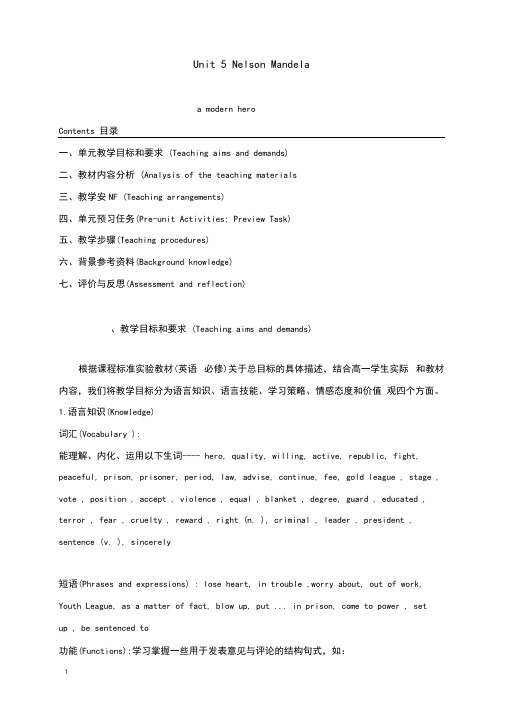
Unit 5 Nelson Mandelaa modern heroContents 目录一、单元教学目标和要求(Teaching aims and demands)二、教材内容分析 (Analysis of the teaching materials三、教学安NF (Teaching arrangements)四、单元预习任务(Pre-unit Activities: Preview Task)五、教学步骤(Teaching procedures)六、背景参考资料(Background knowledge)七、评价与反思(Assessment and reflection)、教学目标和要求(Teaching aims and demands)根据课程标准实验教材(英语必修)关于总目标的具体描述,结合高一学生实际和教材内容,我们将教学目标分为语言知识、语言技能、学习策略、情感态度和价值观四个方面。
1.语言知识(Knowledge)词汇(Vocabulary ):能理解、内化、运用以下生词---- hero, quality, willing, active, republic, fight, peaceful, prison, prisoner, period, law, advise, continue, fee, gold league , stage , vote , position , accept , violence , equal , blanket , degree, guard , educated , terror , fear , cruelty , reward , right (n. ), criminal , leader , president , sentence (v. ), sincerely短语(Phrases and expressions) : lose heart, in trouble ,worry about, out of work, Youth League, as a matter of fact, blow up, put ... in prison, come to power , setup , be sentenced to功能(Functions):学习掌握一些用于发表意见与评论的结构句式,如:1. 发表意见(Giving opinions )Why do you think so? What do you think of …? What's you opinion?agree / don't agree. I think / don't think .... I prefer .... In myopinion ....I'm afraid ....2.评论(Making comments)Good idea! That's an excellent idea .语法(Grammar):定语从句(II )(由where, when, why, 介词+ which, 介词+ whom引导的定语从句)The school where I studied only two years was three kilometres awayThis was a time when you had got to have a passbook to live in JohannesburgThe reason why I got a job was because of my hard work .•••we were put in a position in which we had either to accept we were less important, or fight the Government .The person to whomyou should be grateful for a peaceful South Africa is Nelson Mandela.扩展词汇:negative(消极的),heroine(女主角,女主人公),unwilling(不情愿的),nation(国家,民族),sacrifice(牺牲),realize (认识到),give up (放弃),riches (财富),Bible (圣经),revolution (革命),career (职业),equality (平等),fairness(公平),conflict (冲突),biography (自传),beliefs (信仰),Christianity (基督教),religion (宗教),priests (牧师),version (翻译),readable (易读的),adventure (冒险),scholar (学者),sympathy (同情),,campaign (从事活动),communist (共产主义者),injustice (不公平),oppose (反对),pilot(飞行员) , boycott (联合抵制)2.语言技能(Skills)听:在本单元的课文及练习册听力教学中,能听懂人物和事件以及它们的关系,能抓住所听语段中的关键词,正确理解话语间的逻辑关系。
新人教必修一Unit 5 单元整体教学设计

新人教版必修一 Unit 5 Languages around the World 单元整体教学设计与分析一.本单元整体教学设计理念《普通高中英语新课程标准(2017年版)》以培养和发展学生的学科核心素养为总目标。
英语学科的核心素养包括语言能力、思维品质、文化意识和学习能力。
学科核心素养的发展过程既是语言知识与技能整合发展的实践活动,也是文化感知与理解不断加深、优秀文化品格不断形成的过程,同时还是思维品格和语言学习能力逐步提升的过程。
同时考虑《新课标》提出的语言学习六要素,英语学习活动观和教学实施建议中提出的:“关注主题意义,制定指向核心素养发展的单元整体教学目标”,制定本单元整体教学设计,及学习评价。
本单元在设计时参考了新课标对理解性技能和表达性技能在必修阶段的以下要求:必修阶段理解性技能要求:1. 从语篇中提取主要信息和观点,理解语篇要义;2. 理解语篇中现行或隐性的逻辑关系;3. 把握语篇中主要事件的来龙去脉;4. 抓住语篇中的关键概念和关键细节;5. 辨认关键字词和概念一迅速查找目标信息;6. 批判性地审视语篇内容;7. 识别书面语篇中常见的指代和衔接关系;必修阶段表达性技能要求:1.根据交际需要发起谈话并维持交谈;2.清楚地描述事件的过程;3.使用文字和非文字手段描述个人经历和事物特征;4.在口头书面表达中借助连续性词语,指示代词,词汇衔接等语言手段建立逻辑关系;5.在书面表达中借助标题,图标,图像,表格,版式等传递信息,表达意义;6.根据表达目的选择恰当的语篇类型;7.根据表达的需要选择词汇和语法结构;8.根据表达的需要选择正式与或非正式语;9.借助语调和重音突出需要强调的意义。
本单元教学设计核心是:基于主题意义探究的单元整体教学设计。
二. 单元主题:人与社会 --- 社会责任,语言认知,社会需要,交际拓展三. 单元标题:Languages Around The World四.单元内容分析:本单元主题是围绕语言发展和语言学习展开,内容涉及联合国的工作语言,汉字的发展,英式英语和美式英语的主要区别,英语学习中遇到的困难和解决这些困难的建议等。
高一英语必修一UNIT5教案

篇一:高一英语必修一unit5教学设计教材分析我教的是高一年级上册,人教版,必修1, unit5, nelson mandela---a modern hero 的第一课,这是一节高中阅读课。
教材上这一部分主要分为四个部分:由于第一、二部分联系比较紧密,活动设置也比较好,但我觉得这两部分的活动顺序可以调整一下,即把第二部分放在前面,先呈现图片和简介以引起学生注意力和兴趣,以图片展示的形式激励学生用英语进行语言实践活动,然后归纳出hero的一个模糊标准,为阅读活动做好铺垫。
然后再让他们自己说出他们所认为的a great person 所拥有的品质,这样可能更符合学生的思维习惯特点,并且有利于调动他们的积极性和培养他们说语言的能力。
因此,我决定吧第一、二部分结合在一起作为pre-reading 部分来讲,但顺序做一下调整,之后是正式人物曼德拉的登场,进入主题alias眼中的曼德拉,重点把nelson mandela 挑出来,附加更多关于他的信息,稍加重点地呈现,因为他的信息与接下来的reading passage 联系非常紧密,我想通过重点呈现关于他的信息来提高给学生更多background information,帮助他们更好地理解reading text.第三部分是一个关于elias’ story 的reading text,属于人物传记式的阅读,但是文章的写作角度比较特别,由穷苦的黑人工人alias叙述他眼中的曼德拉,这样的写法比较客观可信。
alias的故事与遭遇同时也成为本文与本课的一条贯穿总线,也是这堂课的中心阅读任务。
学生要做的主要活动就是阅读并理解文章的内容和大意,同时注意一些重点细节信息的把握。
另外,在时间允许的情况下,我还想做一些扩展性的教学活动,比如让学生复述alias 的经历,即达到检测学生的理解又能挑战学生说英语的能力。
the background of students:(1) the supporting background information should be given to students before reading to get them ready and not feel difficult.(2) the teaching procedures and reading task should be designed adaptive to students’ current ability and their cognitive style.(3) teacher should give students necessary guidance on reading strategies(4) teacher should be amiable and patient to make students less nervous.correctly to encourage them and improve their confidence.teaching plan for s1 a reading lesson (lesson 1, unit 5, 必修1)nelson mandela---a modern heroname: 颜巧云 class: english 07(4) group: 4-1teaching/learning objectives4. develop reading skills: skimming, scanning and generalizing the central meaning of the textteaching procedures:stage1. pre-reading (5-10 minutes)do you think he is a great man?step2. guess game for prediction (present pictures of 6 famous persons both in nelson mandela.step2. check ss’ understanding of the main idea of each paragraph through matching.step2. guide ss to finish t/f exercises and give their reasons to check ss’understanding of specific information.information and train their independent thinking and judgment, and help to enhance their ability to organize their ideas logically.people equal?e.g. 1940: born1946: six, educated, 2 years1948: leave school, could not pay fee……….stage3. post-reading (10-15 minutes)step2. listen to the tape and read the quotes from nelson mandela to help ss feel the passion and the firm faith of the great man.step3. guide ss to summarize and explore the implied meaning of the text---a great man need not to be famous, he / she must have some good qualities and devote themselves to helping others.(1) ss try to summarize the language points by themselvespart of verbatim plan for lesson1, unit5, s1a, 必修1-----nelson mandela- a modern herot: (after greeting ss)ss: (some ss may give their opinions)t: do you think he is a great man?ss: yes/no.ss: yes/ no.ss: (get into brainstorming)…t: ok, class, have you finished it?ss: yes.篇二:人教版高中英语必修一 unit 5教案unit 5 nelson mandela——a modern hero教材分析:本单元以 nelson mandela —— a modern hero 为话题,目的在于使学生了解一个伟大的人应具备怎样的品质,学会表达自己的观点,并用所学的句型来描写一个伟人。
人教版英语必修一Unit 5(Reading:Elias’Story)教学设计方案
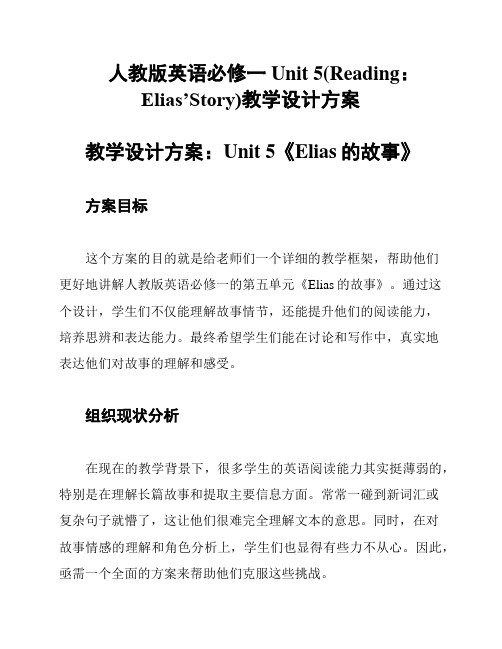
人教版英语必修一Unit 5(Reading:Elias’Story)教学设计方案教学设计方案:Unit 5《Elias的故事》方案目标这个方案的目的就是给老师们一个详细的教学框架,帮助他们更好地讲解人教版英语必修一的第五单元《Elias的故事》。
通过这个设计,学生们不仅能理解故事情节,还能提升他们的阅读能力,培养思辨和表达能力。
最终希望学生们能在讨论和写作中,真实地表达他们对故事的理解和感受。
组织现状分析在现在的教学背景下,很多学生的英语阅读能力其实挺薄弱的,特别是在理解长篇故事和提取主要信息方面。
常常一碰到新词汇或复杂句子就懵了,这让他们很难完全理解文本的意思。
同时,在对故事情感的理解和角色分析上,学生们也显得有些力不从心。
因此,亟需一个全面的方案来帮助他们克服这些挑战。
实施步骤教学准备1. 教材分析教师需要认真阅读《Elias的故事》,分析主题、人物、情节和背景,明确哪些词汇和短语是重点,同时准备一些相关的教学资源,比如图片、视频等。
2. 学习目标设置设定几个具体的学习目标,比如:- 理解故事的主要情节和人物关系。
- 能够用新学的词汇进行简单表达。
- 培养团队合作能力,通过小组讨论深入分析角色和故事情感。
课堂教学1. 导入环节通过展示与故事相关的图片或视频来引导学生进入故事情境。
老师可以问一些开放性的问题,激发他们对故事主题的思考,比如“你觉得勇气和坚持对一个人来说意味着什么?”2. 阅读理解- 分段朗读老师带着学生们分段朗读故事,期间停下来讨论每一段的主要内容,帮助学生理解人物的情感变化。
- 词汇学习针对文本中出现的新词,老师可以设计一些小游戏,比如词汇接龙,帮助学生记忆和运用这些词汇。
3. 角色分析进行小组讨论,学生分成小组分析不同角色的动机和情感。
老师可以提出引导性问题,比如“Elias在故事中遇到了哪些挑战?”和“你认为他的行动反映了什么?”4. 情感共鸣让学生通过写日记的方式,表达对Elias故事的感受。
高一英语必修一第五单元教案

高一英语必修一第五单元教案高一英语必修一第五单元教案「篇一」一、教学目标知识目标1. Get students to learn some useful new words and expressions in this part。
2. Get students to read the play。
3. Let students learn the expressions of ordering food。
能力目标1. Develop students’ reading skills and enable them to learn how to use different reading strategies to read different reading materials。
2. Enable students to understand and act out the play。
3. Have students learn how to use the expressions to order food。
情感目标1. Stimulate students’ interests of learning English by reading and acting this play。
2. Develop students’ sense of group cooperation and teamwork。
二、教学重点1. Develop students’ reading and speaking skills。
2. Let students read and act the play。
3. Have students learn to use the expressions to order food。
三、教学难点1. Enable students to learn to use reading strategies such as skimming, scanning, and so on。
新人教必修一Unit 5 Languages Around the World教案

Unit 5 Languages Around the World-Listening andSpeaking【教材分析】不同于旧教材,语言差异在必修一的第二单元,新教材设置在必修一最后一个单元,可以让学生在语言上有所储备,就是在前几个单元的学习中,既有语言知识,也有语音知识,到了这个时候学生就能够有话可说,有感可发,能够找到不同国家英语的区别。
让学生学习不同国家和地区的英语,就可以培养学生的国际视野,可以降低学习英语的恐惧感,也可以让学生明确自己的目标。
【教学目标与核心素养】1.语言能力目标新课标重视培养学生语言的使用能力,本单元通过听来带动说,和平时生活紧密相关,让学生可以体会到不同国家使用英语的过程中会有不同的口音,中式英语也肯定具有它的特点,但是作为语言学习者,我们应该尽量模仿英美国家使用语言的地道性,这样可以拓展学生的国际视野,有助于下一步的开展跨文化交流。
2.学习能力目标:在听力当中,学生应该有效规划学习方法,选择恰当的策略与方法。
这节课,教师可以侧重培养在听的过程中让学生记录关键信息,写下关键词的训练,让学生不是为了做题而听听力造成的紧张感,又不能在听的过程中只见树木不见森林。
【教学重点】(1)在听的过程中先听懂,然后快速记录下关键信息,并通过交换信息来获取更多信息;(2)明确自己要听的主要内容集中精力抓住重点。
【教学难点】(1)听力中涉及到数字一直是学生听力的难点,要让他们对于20以内的数字比较熟悉,才能听到之后立马反应过来;Unit 5 Languages Around the World-Reading andThinking【教材分析】本节课是高中英语第一册的最后一个单元的阅读和思考部分,文章难度明显增加,体现在以下几个方面:文章题材是说明文,比较难理解;话题生疏,涉及到历史等知识;生词量增大,而且在语境中理解词汇的要求提高。
面对这些,教师的难度和高度也要有所提升,通过探讨说明顺序,了解背景知识等帮助他们找到说明文阅读的方法。
新人教版必修1Unit 5 Languages around the world教学设计

课题
Unit 5 Languages around the world
--Reading for writing
班级
Class 3
Senior 1
授课教师
教
学
目
标
知识与能力:
1. Get students to have a good understanding of how to write a blog about English learning problems.
2. Enable students to use some writing skills flexibly.
过程与方法:
Learn the method of constructing knowledge trees through self-study & cooperative exploration.
教学方法
Task-based Approach
Cooperative Learning
教具准备
Multi-media computer
教学过程
Step 1: Lead in
Play a video: Why do you learn a foreign language?
Step 2: 1. Let’s do an interview.
Begin the class with the lead in: What is an online forum?
What does each of the students write about?
Step 3: Reading for discussion.
1. The teacher is expected to ask students to read a blog silently and then request students to discuss the questions below.
高一英语必修一第五单元教案精选5篇

高一英语必修一第五单元教案精选5篇高一英语必修一第五单元教案【篇1】第一部分:热身快速应答:1.How are you going to school everyday?2.Thank you very much for your help.3.Would mind my opening the window?4.What day was it yesterday?5.What's the weather like today?第二部分:朗读口语朗读技巧:1.声调与降调I have three English books, two Chinese dictionaries and five pens. Do you havea map in your hand? Yes, I do.2.连读:将前一个单词最后的辅音与后一个单词开头的元音连在一起朗读。
half an hour ran out of not at all3.失爆:当相邻两个爆破音在一起时,往往给前面一个爆破音留一个位置,但不爆破,稍停随即发后面的爆破音,这种现象称为“失爆”。
hot bath the next day a good deal of I don’t believe I don’t know I want to say朗读练习:1. A smart housewife was told that there was a kind of stove which would only consume half of the coal she was burning. She was very excited, and said: That'll be terrific! Since one stove can save half of the coal, if I buy two, no coal will be needed!2.The little boy did not like the look of the barking dog.It's all right, said a gentleman, don't be afraid. Don't you know the proverb: Barking dogs don't bite?Ah, yes, answered the little boy. I know the proverb, but does the dog knowthe proverb, too?高一英语必修一第五单元教案【篇2】一、教材分析:本课是结合人教版高中英语教材选修5中有关过去分词的语法内容,进行过去分词的学习,教学中将语法知识的传授和语言基本技能的学习结合到一起,注重复习语法与语言的运用。
高一英语必修一unit5教案

高一英语必修一unit5教案教案名称:Unit 5: Meeting Your New Classmates教学目标:1. 通过学习本单元,学生将能够运用描述人物特征和外貌的词汇,并能够进行简单的自我介绍。
2. 学生将能够在日常生活中运用所学的词汇和句型进行交流,并能够发展有效的交际能力。
3. 学生将培养对他人的关心和尊重,增强团队合作意识。
教学重点:1. 掌握描述人物特征和外貌的词汇。
2. 学会运用目标语言进行简单的自我介绍。
3. 发展有效的交际能力。
教学难点:1. 学生能够使用目标语言进行简单的自我介绍。
2. 学生能够在日常生活中运用所学的词汇和句型进行交流。
教学准备:教材:高中英语必修一(人教版)第五单元的教科书、课后习题、配套教学光盘等。
辅助教具:录音机、多媒体设备、图片、班级展示板等。
教学过程:Step 1: Warm-up (5 minutes)1. Greetings: Greet the students and ask them how they are doing.2. Show pictures of people with different appearances (such as tall, short, fat, thin, etc.) and ask students to describe their appearances.3. Ask students to introduce themselves to their classmates briefly.Step 2: Presentation and Practice (25 minutes)1. Introduce new vocabulary related to physical appearance and personality traits, such as tall, short, fat, thin, funny, serious, etc. Use pictures and gestures to help students understand and remember the words.2. Play the audio files to help students practice pronouncing the new words.3. Ask students to work in pairs and describe their partners using the new vocabulary. For example, \。
新人教版高一英语必修1-Unit 5 Period1Listening and Speaking教案
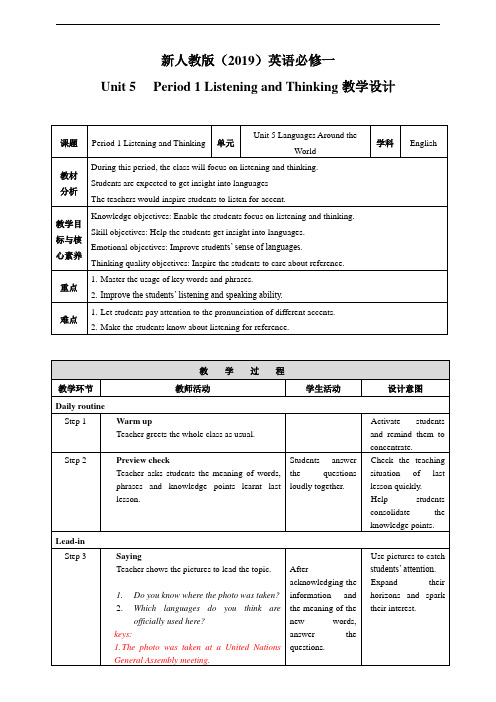
Pair work
Discuss the questions in groups.
Before you listen, match each photo with the correct country name.
keys:
342
615
Discuss which languages are spoken in these countries.
Skill objectives: Help the students get insight into languages.
Emotional objectives: Improve students’ sense of languages.
Thinking quality objectives: Inspire the students to care about reference.
Step 9
Discussion
Teacher shows the topic and gives students examples to discuss.
Work in pairs or groups. Discuss which other language(s) you want to learn and why.
-Check the teaching situation of last lesson quickly.
-Help students consolidate the knowledge points.
Lead-in
Step 3
Saying
Teacher shows the pictures to lead the topic.
人教版高中英语必修1Unit5NelsonMandela—amodernhero教案
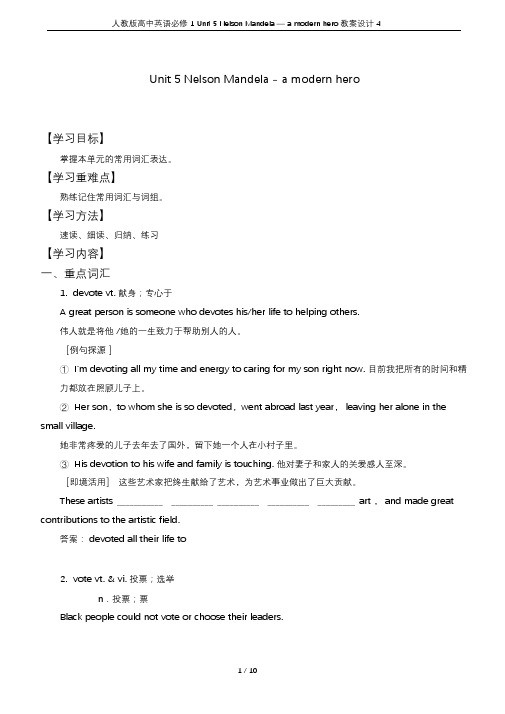
Unit 5 Nelson Mandela - a modern hero【学习目标】掌握本单元的常用词汇表达。
【学习重难点】熟练记住常用词汇与词组。
【学习方法】速读、细读、归纳、练习【学习内容】一、重点词汇1.devote vt. 献身;专心于A great person is someone who devotes his/her life to helping others.伟人就是将他/她的一生致力于帮助别人的人。
[例句探源]①I'm devoting all my time and energy to caring for my son right now. 目前我把所有的时间和精力都放在照顾儿子上。
②Her son,to whom she is so devoted,went abroad last year,leaving her alone in the small village.她非常疼爱的儿子去年去了国外,留下她一个人在小村子里。
③His devotion to his wife and family is touching. 他对妻子和家人的关爱感人至深。
[即境活用]这些艺术家把终生献给了艺术,为艺术事业做出了巨大贡献。
These artists ___________ __________ __________ __________ _________ art ,and made great contributions to the artistic field.答案:devoted all their life to2.vote vt. & vi. 投票;选举n.投票;票Black people could not vote or choose their leaders.当时黑人没有选举权,他们无权选择他们的领导人。
[例句探源]①Did you vote for or against her? 你投了她的赞成票还是反对票?②We will listen to the arguments on both sides and then vote on it. 我们将先听听双方的论点,然后再表决。
人教新课标高中英语必修1Unit5全套教案

Unit 5 Nelson Mandela-a modern hero (全套教案)Teaching plan of Unit 5 Nelson Mandela-a modern heroTeaching aims:1. TopicThe qualities of a great person;The lives of some great people.2. Useful words and expressions:hero quality willing active republic principle fight peaceful prison prisoner period law advise continue fee gold youth league stage vote position accept violence equal blanket degree guard educated terror fear cruelty reward right(n.) criminal leader president sentence(v.) sincerelylose heart in trouble worry about out of work Youth League as a matter of fact b low up put… in prison come to power set up be sentenced to3. Functional items:A. Giving opinions:Why do you think so?What do you think of …?What’s your opinion?I agre e/ don’t agree.I think/don’t think….I prefer….In my opinion….I’m afraid…B. Making comments:Good idea!Th at’s an excellent idea.4. StructuresThe attributive clause (II)由where, when, why, 介词+ which, 介词+ when 引导的定语从句。
新人教版必修一-Unit-5-Nelson-Mandela-Revision[优秀教案]
![新人教版必修一-Unit-5-Nelson-Mandela-Revision[优秀教案]](https://img.taocdn.com/s3/m/4d20bdc629ea81c758f5f61fb7360b4c2e3f2ae6.png)
新⼈教版必修⼀-Unit-5-Nelson-Mandela-Revision[优秀教案]新⼈教版必修⼀-Unit-5-Nelson-Mandela-Revi sion[优秀教案]Unit 5Nelson Mandela—a modern heroPeriod 7Revision(Summing up and Learning tip)整体设计从容说课This is the last teaching period of this unit, so the emphasis should be placed on going over and summarizing what has been learned in this unit. It mainly includes three parts:Summing up, Learning tip and consolidation exercises.Summing up summarizes the whole contents of this unit from the aspects of topics, vocabulary and grammar. The teacher can first use this part to let the students to sum up what they have learned and then explain what the students couldn’t understand very well in this unit. An experienced teacher should design some exercises for the students to do in order that they can learn to use and grasp all the contents.Learning tip encourages students to choose a famous person and try to find out as much aspossible about his or her life. Read what he or she did and what people remember about him or her. Find some people who like him or her and some who do not. Try to find out for what reason they like this person or not. If the students are doing this, they will be teaching themselves a useful way of learning. It is very good for their further study. So, make sure the students have a try.In this period, the teacher can also add more practices to consolidate what the students have learned in this unit. Finally, ask the students to finish Checking yourself on Page 75 in the workbook. This part aims at encouraging students to make a self-assessment after they finish learning this unit. It is very important to improve their learning.教学重点Get the students to review and consolidate what they have learned in this unit.教学难点Get the students to turn what they havelearned into their ability.教学⽅法Summarizing, discussing and practicing教具准备A projector and other normal teaching tools三维⽬标Knowledge aims:1. Get the students to go over useful new words and expressions.2. Have the students review the grammar:the Attributive Clause introduced by relative adverbs and preposition+which/whom. Ability aims:1. Develop the students’ ability to use the important language points.2. Enable the students to learn to use relative adverbs and preposition+which/whom correctly.Emotional aims:1. Encourage the students to learn from famous persons and great persons.2. Strengthen the students’ sense of groupcooperation.教学过程→Step 1 Revision1. Check the homework exercises.2. Dictate some useful new words and expressions in this unit.→Step 2 Lead-inTell the students: Up to now, we have finished Unit 5. Have you learned and grasped all in this unit? Turn to Page 40. You can check yourself by filling in the blanks in the part Summing Up.→Step 3 Summing UpFive minutes for the students to sum up by themselves. Then check and explain something where necessary.Suggested answers:Write down what you have learned about Nelson Mandela.We have learned many noble qualities about Nelson Mandela, such as intelligent, determined, generous, kind, unselfish, hard-working, brave, confident, and so on.From this unit you have also learneduseful verbs:fight, advise, continue, vote, accept, fear, reward, sentenceuseful nouns:hero, quality, republic, principle, fight, prison, prisoner, period, law, fee, gold, youth, league, stage, vote, position, violence, blanket, degree, guard, terror, fear, cruelty, reward, right, criminal, leader, presidentuseful adjectives:willing, active, peaceful, gold, equal, educated, anti-blackuseful expressions:lose heart, in trouble, worry about, out of work, Youth League, as a matter of fact, blow up, put. . . in prison, come to power, set up, be sentenced tonew grammar item:the Attributive Clause introduced by relative adverbs and preposition+which/whom→Step 4 Word and expression exercisesShow the exercises on the screen or give out exercise papers.1. Fill in the blanks with the missing words according to the first letter or Chinese meaning given.1)Nelson Mandela was regarded as one of the best l of the black people.2)I think you must solve your problem in a p way. Fighting can’t solve any problem.3)The full name of our great motherland is the People’s R of China.4)I don’t think ten years is a long p of time.5)You must try to improve the q of all your products.6)Nobody forced me to do it; I was w to do it.7)At present, women hold an important______________ (地位)in our country.8)A middle-aged woman killed her husband, which showed her______________ (残忍).9)You must be______________ (积极的)in all kinds of sports to keep healthy.10)I______________ (劝说)her to give up that idea, but she didn’t listen to me.11)I like all the______________ (男主⾓)of this play, because they are so kind.12)Don’t you think fighting is a serious act of______________ (暴⼒)?13)Since he was better______________ (受过教育的), he got a job in an office.14)The actress in poor health and has to leave______________ (舞台)soon.15)I guess this film will______________ (持续)for another fifteen minutes.2. Fill in each of the blanks with the proper phrase given. Change the form where necessary.1)The sudden heavy snow______________ them______________ getting home as early as expected.2)His glasses fell down to the groundand____________ _______________ _______________ .3)Don’t____________ ____________her health; I think she will take good care of herself.4)I just can’t understand why she is___________ _____________ ___________ again.5)You can’t___________ ___________in face of any difficulty.6)Boys and girls, let’s do our best to help those______________ ______________ .7)It is reported that the new president will__________ ________________ ________________ next month.8)It is said that a new factory will be_____________ _______________ in my hometown.9)The murderer will___________ _____________ ________________ _______________for killing a few girls. 10)The thief will____________ ______________ ____________________________for stealing quite a few expensive cars.First get the students to do the exercises. Then the answers are given. The teacher can give them explanations when necessary.Suggested answers:1. 1)leaders2)peaceful3)Republic 4)period5)quality6)willing7)position 8)cruelty9)active10)advised11)heroes12)violence13)educated14)stage 15)continue2. 1)stopped; from2)broke into pieces3)worry about4)out of work5)lose heart 6)in trouble7)come to power8)set up9)be sentenced to death10)be put in prison→Step 5 Grammar exercisesShow the exercises on the screen or give out exercise papers.1. Complete the following sentences with “preposition+which/whom”.1)This is the rock______________ the boy fell down into the sea.2)Yesterday we had a meeting,______________ we discussed a lot of questions.3)The film star______________ we talked a lot will give us a speech tomorrow.4)Nothing can grow on the moon______________ there is neither water nor air.5)The West Lake______________ Hangzhou is famous in the world will be more beautiful.6)The newspaper______________ he often writes articles is China Daily.7)The stories about the Long March are well written,______________ this is one example.8)The subject______________ Xiao Wang is good is physics.9)The professor______________ Mr. Smith shook hands yesterday has made newdiscoveries in science.10)At last I met the writer______________I had heard long before.2. Fill in the blanks with proper relative pronouns or relative adverbs.1)The city______________ I was born has a lot of parks.2)I don’t like cities______________ have a lot of factories.3)New Year’s Eve is a time______________I am always looking forward to.4)My birthday is a day______________ I think about my future.5)He is the cleverest boy______________ I have ever seen.6)I saw a house the windows of______________ are broken.7)I saw a house______________ windows are broken.8)I will never forget the days______________ I worked together you on the farm.9)He has got himself into a dangerous place______________ he is likely to lose his way.10)We expressed the hope______________ they had expressed.First get the students to do the exercises. Then the answers are given. The teacher can give them explanations where necessary.Suggested answers:1. 1)from which2)at which3)about whom4)on which5)for which6)for which7)of which8)at which9)with whom10)of whom2. 1)where2)which/that3)(which/that) 4)when5)(that)6)which7)whose 8)when9)where 10)(which/that)→Step 6 Learning tipAsk the students to turn to Page 40. Read through the passage and make sure they understand it. Encourage them to do as the passage tells to because if they are doing so they will be teaching themselves a useful way oflearning.→Step 7 Assessment1. Checking yourself (on Page 75 in the Workbook)First get the students to think about these questions individually. Then they can discuss in groups sharing their experience. The teacher can join in and give them advice and suggestions where necessary.2. Testing assessmentShow the exercises on the screen or give out test papers.1)Choose the best answers.(1)Dorothy always spoke highly of her role in the play,______________, of course, made the others unhappy.A. whoB. whichC. thisD. what(2)I shall never forget the days______________ I lived in the country withmy parents.A. thatB. whichC. whenD. at which(3)The factory______________ his brother works lies in the south of the city.A. thatB. whichC. on whichD. where(4)My family climbed up the hills,______________ we had a picnic.A. on the top of whichB. on its topC. on the top of thatD. on the top of it(5)We were next-door neighbors for three years, during______________ we met only twice.A. whichB. thisC. that(6)All______________ is needed is some oil.A. the thingB. thatC. what(7)I, who______________ your friend, will go all out to help you.A. isB. areC. amD. be(8)They took care of the old man______________ son lost his life in the fire.A. whoB. thatC. whichD. whose(9)The scientist,______________ my father worked, went abroad last year.A. by whomB. with whomD. whom(10)Can you tell me the name of the company______________ you visited last week?A. /B. whereC. whatD. to which2)ClozeRead the following passage, get the main idea and fill in the blanks according to the first letters given to complete the passage.Nelson Mandela, b on July 18, 1918, is the first black president of South Africa. He studied l after he entered university. In 1944 he f the ANC Youth League. Then in 1952 he set up a law o to help poor black people. Because of his fight a the government and anti-black laws, he was s to five years hard labor. Fighters from ANC began to b up buildings in 1963 and he was sentenced to life imprisonment on RobbenIsland. Twenty-seven years later, he was f by the white government. In 1993 he was m president of South Africa and the government by and for black people was finally set up.Nelson Mandela is a g man.First get the students to do the following exercises. Then the answers are given. The teacher can give them explanations where necessary.Suggested answers:1)(1)B(2)C(3)D(4)A(5)A (6)B (7)C(8)D(9)B(10)A2)born; law; formed; office; against; sentenced; blow; freed; made; great→Step 8 Homework1. Finish off the Workbook exercises.2. Review and summarize what you have learned in Unit 5.。
- 1、下载文档前请自行甄别文档内容的完整性,平台不提供额外的编辑、内容补充、找答案等附加服务。
- 2、"仅部分预览"的文档,不可在线预览部分如存在完整性等问题,可反馈申请退款(可完整预览的文档不适用该条件!)。
- 3、如文档侵犯您的权益,请联系客服反馈,我们会尽快为您处理(人工客服工作时间:9:00-18:30)。
Unit 5 Nelson Mandela——a modern hero教材分析:本单元以 Nelson Mandela —— a modern hero 为话题,目的在于使学生了解一个伟大的人应具备怎样的品质,学会表达自己的观点,并用所学的句型来描写一个伟人。
提示:1、本单元从warm-up开始,到最后的writing,都是以第三人称的角度来进行描述的,因此,教学中要注意这种人称的前后一致,否则无法前后一致的引导学生进行学习和表达。
2、Reading部分侧重于理解,以及理解基础上的summary,这为最后的writing做好的铺垫和积累(尤其是关键单词、句型和结构的积累),最后的writing要是前面阅读后的仿写(当然能力较强的学生也可以不受限制的开展写作)。
3、如何激发学生学习关于这些伟人的文章,是需要教师思考的:这些伟人学生会感兴趣吗?学生了解多少关于这几位伟人的伟大业绩?从哪些角度来导入会让学生更加的感兴趣?4、教学目标建议增加:通过学习文章和相关素材,进一步了解伟人的生平事迹,尤其是如何才能成为伟人。
培养学生初步使用相关词汇、句型和文章结构进行人物生平描述的口语表达和基础写作能力。
Teaching aims:1. To arouse Ss’ interest in learning about heroes in history2. To develop Ss’ listening and speaking ability.Teaching procedures:Step1 warming up●Describe yourselvesFirst what kind of person are you? (shy, outgoing, fun, mean, immature, nice, kind, honest, brave, loyal, happy, wise, smart, friendly, warm, cheerful, popular, generous, hard-working, diligent, weak, stupid, lazy, dishonest, tense, cold, unkind, miserable, dull, strong-minded, determined etc.)●Discussion (Encourage students to give five or six qualities that theythink great persons have, and give their reasons.)提示:What kind of great persons? Politicians, scientists, or? Different kinds of great persons, different qualities.Question 1: Who do you think are the greatest men in your mind? Can you name some?Question 2: In what way do you consider a man is a great? What is your standard?●Look at page 33 and then ask the Ss if these famous people are greatpeople.●Conclusion:A great person is a person who has followed his or her ideas and sacrificed(牺牲) something so that they could be realized. A pop singer may be very popular with the young people, but he/she is not a great man/woman.A famous person may be well-known but if he or she has not gone through struggles and difficulties for their noble aims, they can not be called a great person.Step2 language points:1. devote vtoneself to 献身于、致力于。
devote one’s life/one’s time to….把生命、时间献给。
…to …把。
用于。
E.g. He devoted his life to promoting world peace.He devoted his life to the promotion of world peace.devoted adj 忠实的, 深爱的be devoted to 对…忠实, 对…深爱a devoted friendShe is devoted to her husband.即学即练The manager devotes all his spare time ______ the violin. B A. to practise B. to practising C. in practising D.for practising2. fight for 为……而战fight against 与……作斗争;与…作战fight with 同…并肩作战; 与…作战E.g. We will have to fight against difficulties.I’ll fight with you, in other words, I’ll support you.Slaves were fighting for freedom.3. give up 表示主动放弃或屈服e.g. He has decided to give up smoking.give in 表示被动屈服或认输,后面不带宾语。
如果接宾语用give in to e.g. You can’t win the game, so you may as well give in.The second period-----extensive readingTeaching aims:1) To have Ss learn about some information about Nelson Mandela and the situation where the black was badly or unfairly treated.2) To get Ss to learn about reason why Nelson Mandela helped the black people to get the same right as white people.Teaching procedures:Step1 make prediction:Read the title of the text and guess what kind of writing the text is. (Narrative writing)Step2 scanning: read the text quickly and then decide how many parts this text can be divided into and then give the main ideas of each part. Part 1(Para. 1---2) The life of Elias’ before he met Nelson Mandela Part 2(Para.3---5) The change of Alias life after he met Nelson Mandela and what Mandela did.Step 3 skimming:Scan the test specific information to finish comprehending part.Step 4Let’s go over the text once more to make a diagram of it with key wordsHomework1. Go over the “Reading ” and find out the useful expressions in it.The third period----intensive readingLanguage points:1. The time when I first met Nelson Mandela was a very difficult period ofmy life.when 在句子中引导的是时间定语从句。
when 指时间,在定语从句中做时间状语:e.g. I still remember the day when I first came to the school.The time when we got together finally came.2. It was in 1952 and Mandela was the black lawyer to whom I went for advice. advice n. a piece of advice 一条建议 ask for advice 征求意见give sb. advice on …关于…给某人建议advise v.1) advise sb. on/ about sth. 就……给某人出主意e.g. I have advised you on that subject.2) advise sb. to do sth. 建议某人干……e.g. Our monitor advises me to practice more spoken English.3)advise doing sth 建议做某事e.g. I advise waiting until tomorrow.4) advise that + (should) doe.g. I advise that you (should) not eat fruit that isn ’t ripe.即学即练I ____ my father to give up smoking, but he didn ’t think it was necessary. AA. advisedB. hopedC. persuadedD. suggested提示:这种“即学即练”对于学生来说能锻炼什么呢?我觉得还是练习阅读理解的,不是练习词义选择的。
